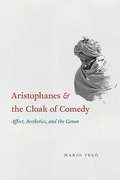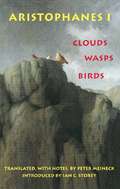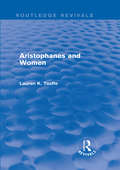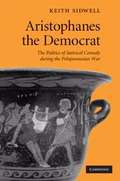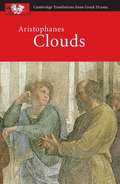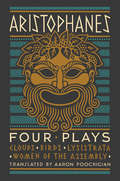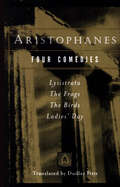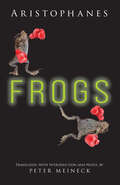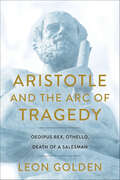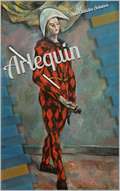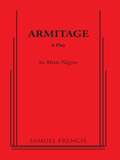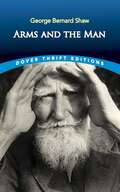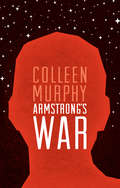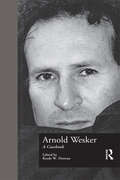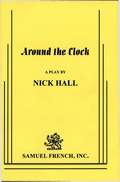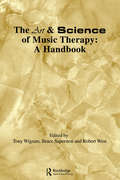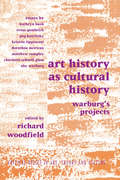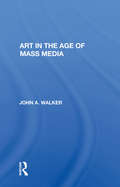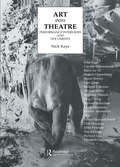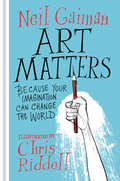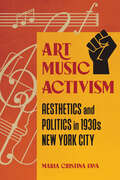- Table View
- List View
Aristophanes & the Cloak of Comedy: Affect, Aesthetics, and the Canon
by Mario TelòThe Greek playwright Aristophanes (active 427–386 BCE) is often portrayed as the poet who brought stability, discipline, and sophistication to the rowdy theatrical genre of Old Comedy. In this groundbreaking book, situated within the affective turn in the humanities, Mario Telò explores a vital yet understudied question: how did this view of Aristophanes arise, and why did his popularity eventually eclipse that of his rivals? Telò boldly traces Aristophanes’s rise, ironically, to the defeat of his play Clouds at the Great Dionysia of 423 BCE. Close readings of his revised Clouds and other works, such as Wasps, uncover references to the earlier Clouds, presented by Aristophanes as his failed attempt to heal the audience, who are reflected in the plays as a kind of dysfunctional father. In this proto-canonical narrative of failure, grounded in the distinctive feelings of different comic modes, Aristophanic comedy becomes cast as a prestigious object, a soft, protective cloak meant to shield viewers from the debilitating effects of competitors’ comedies and restore a sense of paternal responsibility and authority. Associations between afflicted fathers and healing sons, between audience and poet, are shown to be at the center of the discourse that has shaped Aristophanes’s canonical dominance ever since.
Aristophanes 1: Clouds, Wasps, Birds
by Aristophanes Ian C. Storey Peter MeineckOriginally adapted for the stage, Peter Meineck's revised translations achieve a level of fidelity appropriate for classroom use while managing to preserve the wit and energy that led The New Yorker to judge his CloudsThe best Greek drama we've ever seen anywhere," and The Times Literary Supplement to describe his Wasps as "Hugely enjoyable and very, very funny. A general Introduction, introductions to the plays, and detailed notes on staging, history, religious practice and myth combine to make this a remarkably useful teaching text.
Aristophanes and Women (Routledge Revivals)
by Lauren TaaffeAristophanes and Women, first published in 1993, investigates the workings of the great Athenian comedian’s ‘women plays’ in an attempt to discern why they were in fact probably quite funny to their original audiences. It is argued that modern students, scholars, and dramatists need to consider much more closely the conditions of the plays’ ancient productions when evaluating their ostensible themes. Three plays are focused upon: Lysistrata, Thesmophoriazusae, and Ecclesiazusae. All seem to speak quite eloquently to contemporary concerns about women’s rights, the value of women’s work, and the relationships between women and war, literary representation and politics. On the one hand, Professor Taaffe tries to retrieve what an ancient Athenian audience may have l appreciated about these plays and what their central theses may have meant within that culture. On the other hand, Aristophanes is discussed from the perspective of a late twentieth-century, specifically female, reader.
Aristophanes and the Poetics of Competition
by Zachary P. BilesAthenian comic drama was written for performance at festivals honouring the god Dionysos. Through dramatic action and open discourse, poets sought to engage their rivals and impress the audience, all in an effort to obtain victory in the competitions. This book uses that competitive performance context as an interpretive framework within which to understand the thematic interests shaping the plots and poetic quality of Aristophanes' plays in particular, and of Old Comedy in general. Studying five individual plays from the Aristophanic corpus as well as fragments of other comic poets, it reveals the competitive poetics distinctive to each. It also traces thematic connections with other poetic traditions, especially epic, lyric, and tragedy, and thereby seeks to place competitive poetics within broader trends in Greek literature.
Aristophanes the Democrat: The Politics of Satirical Comedy During the Peloponnesian War
by Keith SidwellThis book provides a new interpretation of the nature of Old Comedy and its place at the heart of Athenian democratic politics. Professor Sidwell argues that Aristophanes and his rivals belonged to opposing political groups, each with their own political agenda. Through disguised caricature and parody of their rivals' work, the poets expressed and fuelled the political conflict between their factions. Professor Sidwell rereads the principal texts of Aristophanes and the fragmented remains of the work of his rivals in the light of these arguments for the political foundations of the genre.
Aristophanes' Thesmophoriazusae
by Ashley ClementsAristophanes' comic masterpiece Thesmophoriazusae has long been recognized amongst the plays of Old Comedy for its deconstruction of tragic theatricality. This book reveals that this deconstruction is grounded not simply in Aristophanes' wider engagement with tragic realism. Rather, it demonstrates that from its outset Aristophanes' play draws upon Parmenides' philosophical revelations concerning reality and illusion, employing Eleatic strictures and imagery to philosophize the theatrical situation, criticize Aristophanes' poetic rival Euripides as promulgator of harmful deceptions, expose the dangerous complicity of Athenian theatre audiences in tragic illusion, and articulate political advice to an audience negotiating a period of political turmoil characterized by deception and uncertainty (the months before the oligarchic coup of 411 BC). The book thereby restores Thesmophoriazusae to its proper status as a philosophical comedy and reveals hitherto unrecognized evidence of Aristophanes' political use of Eleatic ideas during the late fifth century BC.
Aristophanes, 2: Wasps, Lysistrata, Frogs, The Sexual Congress (Penn Greek Drama Ser.)
by X. J. Kennedy David R. Slavitt Campbell McGrath Alfred Corn Palmer Bovie R. H. W. DillardThe Penn Greek Drama Series presents original literary translations of the entire corpus of classical Greek drama: tragedies, comedies, and satyr plays. It is the only contemporary series of all the surviving work of Aeschylus, Sophocles, Euripides, Aristophanes, and Menander.
Aristophanes: Clouds
by Aristophanes Judith Affleck John ClaughtonTreating ancient plays as living drama. Classical Greek drama is brought vividly to life in this series of new translations. <P><P>Students are encouraged to engage with the text through detailed commentaries, including suggestions for discussion and analysis. In addition, numerous practical questions stimulate ideas on staging and encourage students to explore the play's dramatic qualities. <P>Clouds is suitable for students of both Classical Civilisation and Drama. Useful features include full synopsis of the play, commentary alongside translation for easy reference and a comprehensive introduction to the Greek Theatre. <P>Clouds is aimed primarily at A-level and undergraduate students in the UK, and college students in North America.<P> Designed for both study and performance, the translations remain faithful to the original Greek, yet have the immediacy of contemporary English.<P> Detailed commentary alongside the translation makes it easy for students to reference and follow, without interrupting their reading of the play.<P> A full synopsis of the play and background information to the story supports students studying a range of plays.<P> A comprehensive introduction to Greek theatre and a guide to the pronunciation of names supports readers and students with no previous knowledge of Greek drama.<P> Activities and suggestions for discussion and analysis allow easy access to the play and enhance reading.<P> Useful notes and questions encourage discussion on the themes and dramatic qualities of the text, and the more practical issues of staging and performance.
Aristophanes: Clouds, Birds, Lysistrata, Women Of The Assembly
by AristophanesCapturing the antic outrageousness and lyrical brilliance of antiquity’s greatest comedies, Aaron Poochigian’s Aristophanes: Four Plays brings these classic dramas to vivid life for a twenty-first century audience. The citizens of ancient Athens enjoyed a freedom of speech as broad as our own. This freedom, parrhesia, the right to say what one pleased, how and when one pleased, and to whom, had no more fervent champion than the brilliant fifth-century comic playwright Aristophanes. His plays, immensely popular with the Athenian public, were frequently crude, even obscene. He ridiculed the great and the good of the city, showing up their hypocrisy and arrogance in ways that went far beyond the standards of good taste, securing the ire (and sometimes the retaliation) of his powerful targets. He showed his contemporaries, and he teaches us now, that when those in power act obscenely, patriotic obscenity is a fitting response. Aristophanes’s satirical masterpieces were also surpassingly virtuosic works of poetry. The metrical variety of his plays has always thrilled readers who can access the original Greek, but until now, English translations have failed to capture their lyrical genius. Aaron Poochigian, the first poet-classicist to tackle these plays in a generation, brings back to life four of Aristophanes’s most entertaining, wickedly crude, and frequently beautiful lyric comedies—the pinnacle of his comic art: · Clouds, a play famous for its caricature of antiquity’s greatest philosopher, Socrates; · Lysistrata, in which a woman convinces her female compatriots to withhold sex from their warmongering lovers unless they negotiate peace; · Birds, in which feathered creatures build a great city and become like gods; · and Women of the Assembly, Aristophones’s most revolutionary play, which inverts the norms of gender and power. Poochigian’s new rendering of these comic masterpieces finally gives contemporary readers a sense of the subversive pleasure Aristophones’s original audiences felt when they were first performed on the Athenian stage.
Aristophanes: Four Comedies
by AristophanesNew English versions of Lysistrata, The Frogs, The Birds, and Ladies' Day. "Thanks to Dudley Fitts...we can appreciate Aristophanes' vigor, his robust style, his scorching wit, his earthy humor, his devotion to honesty and his poetic imagination" (Brooks Atkinson, New York Times). Index.
Aristophanes: Frogs
by AristophanesAristophanes's classic send-up of rivalry within the ultra-competitive world of fifth-century Athenian theatre wins a new lease on life in this fresh line-for-line translation by Peter Meineck. Premiered in 2021 by Aquila Theatre and accompanied here by Meineck&’s notes and wide-ranging Introduction, this Frogs offers the best view yet of a high-stakes afterlife contest between two of Athens's late great playwrights. Both are undisputed masters of tragedy. But only one can win and return to save the city.
Aristotle and the Arc of the Tragedy: Oedipus Rex, Othello, Death of a Salesman
by Leon GoldenAristotle and the Arc of Tragedy is the latest of Leon Golden’s books to connect Ancient Greece to modern culture. In a world facing many pressing issues Classics professor Golden wants to champion the values and achievements of Classical Civilization. He asserts that Homeric Epic and Greek Tragedy are as relevant today as they were millennia ago because they are riveting and insightful studies of the human condition. Their universality grants them a contemporary relevance despite the passage of time and changes in custom and taste.In one of his previous books, Understanding the Iliad, Golden illuminated the relevance of The Iliad for modern readers. The Bryn Mawr Classical Review praised Understanding the Iliad because it, “achieves what it sets out to accomplish: to provide an interpretation of the Iliad that emphasizes its didactic aspects, its ability to improve its readers by presenting the spectacle of the evolution of a flawed warrior consumed by destructive anger to a legitimate hero who transcends his narcissism and grandiosity and reaches out to others and by doing so heals his own aching soul in the process.”Golden, making use of correspondence and personal contact with Joseph Heller, himself, argues convincingly in Achilles and Yossarian that Homer’s The Iliad exerted a profound influence over Heller as he wrote his modern classic, Catch-22. A Kirkus review acclaims Achilles and Yossarian in these words: “Golden combines impressive erudition with a sharp critical eye and a lucid prose style that laymen will find accessible and engaging. The result is an original and persuasive work of literary scholarship that finds much more than mere war stories in these classics.”
Arlequín
by Ana Bowlova Ana Claudia AntunesUna bailarina ve su vida transformada completamente cuando su supuesto amante la convierte en víctima después de haber arruinado su carrera en una prometedora compañía de baile, lo que la lleva a probar subterfugios para alcanzar la fama. Cuando todo parece completamente perdido, ella experimenta un cambio completo y pasa a escribir guiones. No sabe que ya está viviendo como un fantasma y vive atormentando a una niña que nació en el siglo veintiuno y pasó por una experiencia similar a la suya. ¿Estará ella preparada para enfrentar a sus propios demonios o sucumbirá a las fuerzas descomunales que le impedirán seguir relatando ambas vidas? Un thriller con buenas dosis de humor y terror sazonados con la maestría artística del siglo diecinueve y veinte que dan vida a una saga familiar de quienes sueñan por alcanzar la gloria final, o fatal. Ana, una adolescente que sueña en ser actriz, se ve envuelta en un complot donde el fantasma de una bailarina del siglo diecinueve, quien pasa a contactarla primero para contarle su historia, no parece corresponder con los hechos relatados por otro fantasma, supuestamente su amante y posible asesino en serie, y que también se le aparece para insertarse en su mundo por estar involucrado en el mismo caso. Ella espera resolver el asunto lo más rápido posible, antes de que ellos la devoren o la envuelvan aun más en su maraña de malos entendidos, o que ella comience a dejar de creer en lo que perciben sus propios oídos y se pierda en el camino de su propia absolución atada en un desequilibrio emocional que al principio revela una línea ancestral difícil de recorrer. Para eso ella necesita de todo su coraje para así encontrar la heroína que hay dentro de sus venas, encarando su propia suerte... a la propia muerte. Serie "Amor de Pierrot": Pierrot & Colombina (LIBRO 1) El Fantasma del Ballet (LIBRO 2) Arlequin (LIBRO 3) Diario de una Colombina (LIBRO 4)
Armitage
by Don NigroMystery / 6 m., 6 f. / Unit set / Zachary Pendragon rages among the tombstones of the family burial plot. Filled with hatred and waiting for him to die, his stepdaughter Margaret watches from their Gothic mansion in the east Ohio woods. So begins the dark and labyrinthine tale of a family with a complex and terrible history. Through Margaret's journal, Zach's memories, the batty poetry of Margaret's mother, and the memories of Zach's tormented son John, a Gothic tale woven back and forth in time and space emerges. It is a tale of desperate love and suspicious deaths, of desire, murder, madness, grief and terror. Having the richness and beauty of a complex Gothic novel or a Jacobean nightmare, this remarkable saga of happenings in the Pendragon mansion builds to a stunning conclusion that is guaranteed to surprise. Perhaps the most haunting of the author's cycle of Pendragon Plays, this mystery is both funny and grotesque, moving and hypnotic.
Arms and the Man
by George Bernard ShawIn the opening scene of Arms and the Man, which establishes the play's embattled Balkan setting, young Raina learns of her suitor's heroic exploits in combat. She rhapsodizes that it is "a glorious world for women who can see its glory and men who can act its romance!" Soon, however, such romantic falsifications of love and warfare are brilliantly and at times hilariously unmasked in a comedy that reveals George Bernard Shaw at his best as an acute social observer and witty provocateur. First produced on the London stage in 1894, Arms and the Man continues to be among the most performed of Shaw’s plays around the world. The play is reprinted in its entirety here from an authoritative British edition, and is complete with Shaw's stimulating preface to Volume II of Plays: Pleasant and Unpleasant.
Armstrong's War
by Colleen MurphyAfter suffering a crippling injury during a tour of Afghanistan, Michael has returned home to a Canadian veteran's care facility. The last thing he wanted was to spend his time with a twelve-year-old girl, but Halley, a spirited, physically disabled Pathfinder, is eager to earn her volunteer badge. The pair is at odds from the start, but they find a shared interest in reading The Red Badge of Courage, the classic American Civil War novel, which spurs them to reveal their own stories. As their friendship grows, uncomfortable truths are exposed and questioned, redefining the meaning of courage and heroism.
Arnold Wesker: A Casebook (Casebooks on Modern Dramatists)
by Reade W. DornanFirst Published in 1998. Routledge is an imprint of Taylor & Francis, an informa company.
Around the Clock
by Nick HallComedy / 6f / Interior / A medieval German clock with life-sized moving figures of a saint, an angel, a knight and a wicked pagan queen has been acquired by a small American town, and six women want to stage a publicity event: an enactment of the movements of this amazing clock. The relationships among the ladies are nearly as intricate as the clockworks: two have been married to the same man, the young teacher is after another's husband and, of course, the ex-show girl wants to star. Polly, who is hosting a rehearsal, finds having her bossy adult daughter living in her house again difficult. Hilarious complications arise as this explosive group works out the casting and the choreography. Beneath their laughter lurks the truth about who is an angel and who is more like the sinister queen. Fast-paced and funny with a touch of poignancy, this inventive play is by the author of Accommodations, Beside Yourself, Marriage Is Murder and other popular comedies.
Arrested Welcome: Hospitality in Contemporary Art
by Irina AristarkhovaInterpreting the meaning of hospitality in an unwelcoming political moment Amid xenophobic challenges to America&’s core value of welcoming the tired and the poor, Irina Aristarkhova calls for new forms of hospitality in her engagement with the works of eight international artists. In this first monograph on hospitality in contemporary art, Aristarkhova employs a feminist perspective to critically explore the artworks of Ana Prvački, Faith Wilding, Lee Mingwei, Kathy High, Mithu Sen, Pippa Bacca, Silvia Moro, and Ken Aptekar and asks who, how, and what determines who is worthy of our welcome. Spanning a diverse range of contemporary art practices, Arrested Welcome shows how artists challenge our existing notions of hospitality—culturally, philosophically, and politically. From the role of &“microcourtesies&” in social change to the portrayal of waiting as a feminist endeavor, Aristarkhova looks deeply into topics such as gender stereotypes of welcome, ways to reclaim civility, and the means by which guests (sometimes human, sometimes animal) push the limits of our hosting traditions. Blending a feminist analysis of hospitality with in-depth case studies on how contemporary artists stimulate personal reflection and political engagement, Aristarkhova initiates these important conversations at a critical time of national and international hospitality crises.
Art & Science of Music Therapy: A Handbook
by Tony Wigram Robert West Bruce SaperstonFirst Published in 1995. Routledge is an imprint of Taylor & Francis, an informa company.
Art History as Cultural History: Warburg's Projects (Critical Voices in Art, Theory and Culture)
by Richard WoodfieldThis book focuses on Aby Warburg (1866-1929), one of the legendary figures of twentieth century cultural history. His collection, which is now housed in the Warburg Institute of the University of London bears witness to his idiosyncratic approach to a psychology of symbolism, and explores the Nachleben of classical antiquity in its manifold cultural legacy. This collection of essays offers the first translation of one of Warburg's key essays, the Gombrich lecture, described by Carlo Ginzburg as 'the richest and most penetrating interpretation of Warburg' and original essays on Warburg's astrology, his Mnemosyne project and his favourite topic of festivals. Richard Woodfield is Research Professor in the Faculty of Art and Design at the Nottingham Trent University, England. He has edited E.H Gombrich's Reflections on the History of Art (1987), Gombrich on Art and Psychology (1996), The Essential Gombrich (1996), and a volume on Riegl in the Critical Voices in Art, Theory and Culture series. He is also the General Editor of a new series of books for G+B Arts International, Aesthetics and the Arts. Edited by Richard Woodfield, Research Professor in the Faculty of Art and Design at Nottingham Trent University, UK.
Art In The Age Of Mass Media
by John WalkerCan fine art survive in an age of mass media? If so, in what forms and to what purpose? And can radical art still play a critical role in today's divided world? These are the questions addressed in the Art in the Age of Mass Media, as John Walker examines the fascinating relationship between art and mass media, and the myriad interactions between h
Art Into Theatre: Performance Interviews and Documents (Contemporary Theatre Studies #Vol. 16.)
by Nick KayeArt Into Theatre investigates the processes of hybrid forms of performance developed between 1952 and 1994 through a series of interviews with key practitioners and over 80 pieces of documentation, many previously unpublished, of the works under discussion.Ranging from the austerity of Cage's 4'33" through the inter-species communication of Schneeman's Cat Scanand the experimental theatre work of Schechner, Foreman, and Kirby, to the recent performances of Abramovic, Forced Entertainment and the Wooster Group, Art Into Theatre offers a fascinating collection of perspectives on the destabilizing of conventional ideas of the art "object" and the theatrical "text". Nick Kaye's introductory essay to the volume offers a useful context for the reader and each interview is preceded by an informative biographical sketch.
Art Matters: Because Your Imagination Can Change the World (Apple FF)
by Neil Gaiman Chris RiddellA stunning and timely creative call-to-arms combining four extraordinary written pieces by Neil Gaiman illustrated with the striking four-color artwork of Chris Riddell.“The world always seems brighter when you’ve just made something that wasn’t there before.”—Neil GaimanDrawn from Gaiman’s trove of published speeches, poems, and creative manifestos, Art Matters is an embodiment of this remarkable multi-media artist’s vision—an exploration of how reading, imagining, and creating can transform the world and our lives.Art Matters bring together four of Gaiman’s most beloved writings on creativity and artistry: “Credo,” his remarkably concise and relevant manifesto on free expression, first delivered in the wake of the Charlie Hebdo shootings“Make Good Art,” his famous 2012 commencement address delivered at the Philadelphia University of the Arts“Making a Chair,” a poem about the joys of creating something, even when words won’t come“On Libraries,” an impassioned argument for libraries that illuminates their importance to our future and celebrates how they foster readers and daydreamersFeaturing original illustrations by Gaiman’s longtime illustrator, Chris Riddell, Art Matters is a stirring testament to the freedom of ideas that inspires us to make art in the face of adversity, and dares us to choose to be bold.
Art Music Activism: Aesthetics and Politics in 1930s New York City (Music in American Life)
by Maria Cristina FavaSurrounded by the widespread misery of the Depression, left-leaning classical music composers sought a musical language that both engaged the masses and gave voice to their concerns. Maria Cristina Fava explores the rich creative milieu shaped by artists dedicated to using music and theater to advance the promotion, circulation, and acceptance of leftist ideas in 1930s New York City. Despite tensions between aesthetic and pragmatic goals, the people and groups produced works at the center of the decade’s sociopolitical and cultural life. Fava looks at the Composers’ Collective of New York and its work on proletarian music and workers’ songs before turning to the blend of experimentation and vernacular idioms that shaped the political use of music within the American Worker’s Theater Movement. Fava then reveals how composers and theater practitioners from these two groups achieved prominence within endeavors promoted by the Works Project Administration. Fava’s history teases out fascinating details from performances and offstage activity attached to works by composers such as Marc Blitzstein, Charles Seeger, Ruth Crawford Seeger, Elie Siegmeister, and Harold Rome. Endeavors encouraged avant-garde experimentation while nurturing innovations friendly to modernist approaches and an interest in non-western music. Blitzstein’s The Cradle Will Rock offered a memorable example that found popular success, but while the piece achieved its goals, it became so wrapped up in myths surrounding workers’ theater that critics overlooked Blitzstein’s musical ingenuity. Provocative and original, Art Music Activism considers how innovative classical composers of the 1930s balanced creative aims with experimentation, accessible content, and a sociopolitical message to create socially meaningful works.
